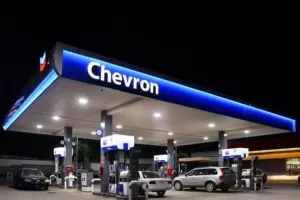The US government gives Chevron limited authorization to resume pumping oil from Venezuela after reaching a humanitarian agreement
The US Government gives Chevron Limited authorization to resume pumping oil from Venezuuela after reaching a humanitarian agreement

Chevron is one of the few international companies still working in Venezuela, and its decision to continue pumping oil there has been met with some backlash from US officials. The US government granted Chevron limited authorization on Thursday to resume pumping oil as part of a humanitarian agreement between the two countries that aims to provide humanitarian aid for Venezuelans affected by the collapse of their country’s economy. Under the new agreement, Chevron will be allowed only enough production capacity so that it can provide minimum levels of food and medical supplies while maintaining its business operations in Venezuela.”
Chevron is nearing an agreement to resume pumping oil in Venezuela.
Chevron is a US oil company that has been in Venezuela since the 1920s. In the past, it’s been accused of human rights abuses and environmental damage in the country. However, it’s also one of Venezuela’s biggest companies and its economy relies on oil exports—so when people talk about sanctions against Venezuela, they’re really talking about Chevron too.
Venezuela has been suffering from economic sanctions imposed by the US government since 2017; these include limits on travel between countries and trade restrictions on certain goods (like food). Since then, shortages have become widespread across several industries including medicine and toilet paper; inflation is estimated at over 700% per year!
The decision only gives limited authorization for Chevron to pump oil, under the condition that it is used for humanitarian purposes.
The decision only gives limited authorization for Chevron to pump oil, under the condition that it is used for humanitarian purposes. This means that Chevron will not be able to drill new wells or expand its operations in Venezuela.
The US government says it has reached an agreement with Venezuela’s government and opposition parties on how they will ensure the oil revenue goes towards humanitarian projects instead of being used by President Nicolas Maduro’s government.
Chevron has been in Venezuela since the 1920s and is one of the few international companies still working there.
Chevron has been in Venezuela since the 1920s, and is one of the few international companies still working there. It’s also one of only a few major US oil companies that has continued to operate in Venezuela since the 1970s.
Because of its long history with Venezuela, Chevron has negotiated for limited authorization to resume pumping oil from its deepwater wells after reaching an agreement with Venezuelan authorities that allows them access to their assets while they reassess their operations following sanctions against US companies operating in other parts of Latin America, including Brazil and Argentina.
Oil exports account for 95% of Venezuela’s revenue, and production has drastically decreased since 2016.
Oil production has decreased by more than half since 2014.
Oil production in Venezuela, which accounts for 95% of all government revenue, has drastically decreased since 2016. In addition to the drop in oil production, there have been shortages of basic goods like food and medicine as well as inflation of up to 3,000%.
The US government’s decision to allow Chevron to continue pumping oil will help the country keep at least some of its income without breaking US sanctions that are meant to stop Venezuelan President Nicolás Maduro from profiting off his country’s natural resources.
The US government’s decision to allow Chevron to continue pumping oil from Venezuela will help the country keep at least some of its income without breaking US sanctions that are meant to stop Venezuelan President Nicolás Maduro from profiting off his country’s natural resources.
The sanctions were first imposed by former President Barack Obama in 2016, after he accused Maduro of being responsible for increasing poverty and hunger in Venezuela (a claim he has denied). The restrictions on oil imports were expanded under Donald Trump last year after another round of protests against the socialist leader failed to result in any meaningful change.
The United States wants to see more action from other countries—including Russia—that have traded with Maduro’s administration before considering lifting sanctions on those who do business there; Russia last month agreed not only not sell any more oil but also not help build new refineries or supply equipment so as not encourage further shipments into Europe’s largest market for refined products like gasoline and diesel fuel
The US government is granting approval for Chevron to continue some of its work in Venezuela because it helps limit Maduro’s personal profit from its oil reserves.
The US government is giving Chevron limited authorization to resume pumping oil in Venezuela, and the decision only gives limited authorization for Chevron to pump oil. Under the agreement, it will be used for humanitarian purposes only.
Conclusion
What this means is that Venezuela will have some income and the US government has helped to limit Maduro’s personal profit by allowing Chevron to pump oil during these difficult times







